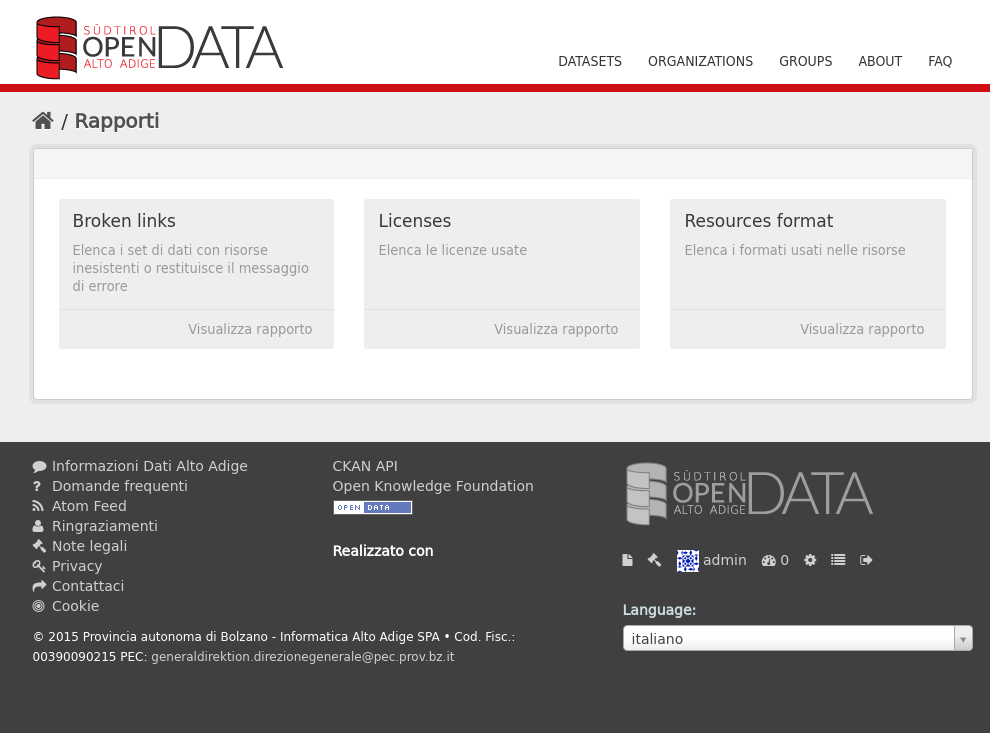Other CKAN extensions¶
Introduction¶
In this document you’ll only find specific information for installing some CKAN official and unofficial extensions.
Provincia Di Bolzano Extension¶
The ckanext-provbz CKAN’s extension provides some customizations for the CKAN Look and Feel and other. In addition this extension provides an harvester that merge functionalities between two other harvesters built on the ckanext-spatial extension like:
- https://github.com/geosolutions-it/ckanext-multilang
- https://github.com/geosolutions-it/ckanext-geonetwork
Requirements¶
The ckanext-provbz extension has been developed for CKAN 2.4. Other extensions needed as dependencies are:
Development Installation¶
To install ckanext-provbz:
Activate your CKAN virtual environment, for example:
. /usr/lib/ckan/default/bin/activate
Go into your CKAN path for extension (like /usr/lib/ckan/default/src)
cd ckanext-provbz
python setup.py install
Initilize the provbz additional DB table for custom metadata fields:
paster --plugin=ckanext-provbz provbzdb initdb --config=/etc/ckan/default/production.ini
Add
provbzandprovbz_harvesterto theckan.pluginssetting in your CKAN config file (by default the config file is located at/etc/ckan/default/production.ini).The ckanext-provbz extension provides some updates for the i18n files for ‘it’ and ‘de’ languages. Locale files in CKAN (.mo and .po) for these languages must be replaced with files located in this extension at the ckanext-provbz/ckanext/provbz/i18n/ path.
Update the production.ini configuration finding the default property
licenses_group_urland change the value:licenses_group_url = file:///usr/lib/ckan/default/src/ckanext-provbz/ckanext/provbz/licenses/ckan.json
Update the production.ini configuration finding the default property
i18n_directoryand change the value:ckan.i18n_directory = /usr/lib/ckan/default/src/ckanext-provbz/ckanext/provbz/translations
Restart CKAN.
Authentication Extension¶
Provincia di Bolzano uses an authentication system that has some mechanics inherited from Shibboleth. An external system will perform user authentication, and user info will be passed to CKAN via HTTP headers.
An ad-hoc extension has been implemented to deal with this external system.
The authenticator plugin repository is at https://github.com/geosolutions-it/ckanext-provbz-auth
Installation¶
Activate your CKAN virtual environment:
. /usr/lib/ckan/default/bin/activate
Go into your CKAN path for extension:
cd /usr/lib/ckan/default/src
Import the project from the github repository and install it:
git clone https://github.com/geosolutions-it/ckanext-provbz-auth.git
cd ckanext-provbz-auth
python setup.py install
Plugin configuration¶
You have to configure the provbz-auth plugin. There are a couple of configuration files to edit:
/etc/ckan/default/production.ini
- Tells CKAN to load the provbz-auth plugin
/etc/ckan/default/who.ini
- Tells the auth framework to use the provbz-auth plugin for authentication.
- Tells the provbz-auth plugin how to retrieve the info about the authenticated user.
production.ini configuration¶
Edit the file /etc/ckan/default/production.ini and append provbz_auth to the ckan.plugins line:
ckan.plugins = [...] provbz_auth
Configure external login and logout URLs:
ckanext.provbzauth.login_url = https://test-data.civis.bz.it/Shibboleth.sso/Login?target=https%3A%2F%2Ftest-data.civis.bz.it&authnContextClassRef=SPID+CNS+PROV.BZ+SIAG.IT+GVCC.NET+lang%3a{{LANG}}
ckanext.provbzauth.logout_url = https://test-data.civis.bz.it/Shibboleth.sso/Logout
who.ini configuration¶
Inside the directory /etc/ckan/default/ we created the symbolic link who.ini
linking the file /usr/lib/ckan/default/src/ckan/who.ini.
We need to edit this file to configure some info for the provbz-auth integration.
We don’t want to modifiy the original file so we’ll have to:
Rename the symbolic link so we still have a reference to the original file:
mv /etc/ckan/default/who.ini /etc/ckan/default/orig.who.ini
Create a new file copy to edit:
cp /usr/lib/ckan/default/src/ckan/who.ini /etc/ckan/default/provbz-auth.who.ini
Create a symlink, so you may easily switch back to the original configuration should you need to:
ln -s /etc/ckan/default/provbz-auth.who.ini /etc/ckan/default/who.ini
Now let’s edit the /etc/ckan/default/provbz-auth.who.ini file.
Add the plugin:provbz_auth section, customizing the env var names:
[plugin:provbz_auth]
use = ckanext.provbzauth.repoze.ident:make_identification_plugin
eppn = HTTP_SHIB_IDP_UID
authtype = HTTP_SHIB_AUTHTYPE
check_auth_key = HTTP_SHIB_ORIGINAL_AUTHENTICATION_INSTANT
check_auth_op = not_empty
pm_url = https://test-profilemanager.....
pm_user = ....
pm_pw = ....
Add provbz_auth to the list of the identifier plugins:
[identifiers]
plugins =
provbz_auth
friendlyform;browser
auth_tkt
Add ckanext.provbzauth.repoze.auth:ProvBzAuthenticator to the list of the authenticator plugins:
[authenticators]
plugins =
auth_tkt
ckan.lib.authenticator:UsernamePasswordAuthenticator
ckanext.provbzauth.repoze.auth:ProvBzAuthenticator
Add provbz_auth to the list of the challengers plugins:
[challengers]
plugins =
provbz_auth
# friendlyform;browser
# basicauth
Apache HTTPD configuration¶
The ckanext-provbz-auth extension requires that a couple of external URLs (login and logout) are handled by the external system.
The URLs are the ones defined in the ckanext.provbzauth.*_url properties.
This is the complete ckan.conf configuration file you can use as a reference.
CKAN locales configuration¶
The ckanext-provbz-auth extension defines some own locale strings defined into the internal .mo and .po files at ckanext-provbz-auth/ckanext/provbzauth/i18n/.
As reported above, for the ckanext-provbz installation steps, at this point you have already updated the default CKAN’s locale files.
So the locales information of the ckanext-provbz-auth extension should be just appended to the existing ones (‘it’ and ‘de’) in CKAN as described below:
1 - Open the file:
ckanext-provbz-auth/ckanext/provbzauth/i18n/it/LC_MESSAGES/ckanext-provbz-auth.po
2 - Copy the content reported below:
#: ckanext/repoze/who/shibboleth/controller.py:25
msgid "No user info received for login"
msgstr "Non sono state ricevute informazioni sull'utente"
#: ckanext/repoze/who/shibboleth/templates/user/snippets/login_form.html:25
msgid "Shibboleth"
msgstr "Shibboleth"
#: ckanext/repoze/who/shibboleth/templates/user/snippets/login_form.html:26
msgid "Login through Shibboleth."
msgstr "Accedi attraverso Shibboleth"
#: ckanext/repoze/who/shibboleth/templates/user/snippets/login_form.html:33
msgid "Login via Shibboleth"
msgstr "Accedi attraverso Shibboleth"
#: ckanext/repoze/who/shibboleth/templates/user/snippets/login_form.html:45
msgid "Authentication by using local account"
msgstr "Autenticazione con account locale"
#: ckanext/repoze/who/shibboleth/templates/user/snippets/login_form.html:49
msgid "Username"
msgstr "Nome utente"
#: ckanext/repoze/who/shibboleth/templates/user/snippets/login_form.html:50
msgid "Password"
msgstr "Password"
#: ckanext/repoze/who/shibboleth/templates/user/snippets/login_form.html:59
msgid "Log in"
msgstr "Accedi"
3 - Append it at the end of the CKAN’s related file for ‘it’:
ckan/ckan/i18n/it/LC_MESSAGES/ckan.po
4 - Rebuild the ckan.mo file with the updated content using the following command:
cd /usr/lib/ckan/default/src/ckan
. /usr/lib/ckan/default/bin/activate
python setup.py compile_catalog --locale it
5 - Repeat the steps above for the ‘de’ locales and finally restart CKAN.
GeoNetwork harvester¶
The GeoNetwork harvester extends the base CSW harvester type, adding some features as explained in Harvesting configuration, such as:
- handling the
default_tagsanddefault_extrasparameters; - adding a couple of
extrasentries which contain URLs to GeoNetwork info.
Requirements¶
The ckanext-multilang extension has been developed for CKAN 2.2 or later. Other extensions needed as dependencies are:
Installation¶
In order to install the extension, log in as user ckan, activate the virtual env and check out the extension:
. /usr/lib/ckan/default/bin/activate
cd default/src/
git clone https://github.com/geosolutions-it/ckanext-geonetwork.git
cd ckanext-geonetwork
python setup.py install
Add plugin in /etc/ckan/default/production.ini:
ckan.plugins = [...] geonetwork_harvester
Restart supervisord:
systemctl stop supervisord
systemctl start supervisord
Multilang Extension¶
The ckanext-multilang CKAN’s extension provides a way to localize your CKAN’s title and description contents for: Dataset, Resources, Organizations and Groups. This extension creates some new DB tables for this purpose containing localized contents in base of the configured CKAN’s locales in configuration (the production.ini file). So, accessing the CKAN’s GUI in ‘en’, for example, the User can create a new Dataset and automatically new localized records for that language will be created in the multilang tables. In the same way, changing the GUI’s language, from the CKAN’s language dropdown, the User will be able to edit again the same Dataset in order to specify ‘title’ and ‘description’ of the Dataset for the new selected language. In this way Dataset’s title and description will automatically changed simply switching the language from the CKAN’s dropdonw.
Requirements¶
The ckanext-multilang extension has been developed for CKAN 2.4. Other extensions needed as dependencies are:
Installation¶
In order to install the extension, log in as user ckan, activate the virtual env and check out the extension:
Activate your CKAN virtual environment, for example:
. /usr/lib/ckan/default/bin/activate
Go into your CKAN path for extension (like /usr/lib/ckan/default/src)
git clone https://github.com/geosolutions-it/ckanext-multilang.git
cd ckanext-multilang
python setup.py install
Initilize the multilang tables:
paster --plugin=ckanext-multilang multilangdb initdb --config=/etc/ckan/default/production.ini
Add
multilangandmultilang_harvesterto theckan.pluginssetting in your CKAN config file (by default the config file is located at/etc/ckan/default/production.ini).Update the Solr schema.xml file used by CKAN (located at /etc/solr/ckan/conf/) introducing the following elements:
Inside the ‘fields’ Tag:
<dynamicField name="package_multilang_localized_*" type="text" indexed="true" stored="true" multiValued="false"/>
as first ‘dynamicField’
A new ‘copyField’ to append:
<copyField source="package_multilang_localized_*" dest="text"/>
Restart Solr.
Restart CKAN.
Pages Extension¶
This extension gives you an easy way to add simple pages to CKAN.
Requirements¶
The ckanext-pages extension has been developed for CKAN 2.3 or later.
Installation¶
Activate your CKAN virtual environment:
. /usr/lib/ckan/default/bin/activate
Go into your CKAN path for extension:
cd /usr/lib/ckan/default/src
Import the project from the github repository and install it:
git clone https://github.com/geosolutions-it/ckanext-pages.git
cd ckanext-pages
git checkout multilang
python setup.py install
Configure the extension in the CKAN’s configuration file:
vim /etc/ckan/default/production.ini
Add the following configuration lines:
# Ckan Pages config options
ckanext.pages.allow_html = True
ckanext.pages.editor = ckeditor
Enable the plugin by appending the name of the extension to the plugin property:
ckan.plugins = ... pages
Finally restart CKAN.
Reports extension¶
ckanext-gsreports provides aggregated information about:
- resources formats used,
- license types used
- resources which links to errorous or invalid urls.
This extension uses ckanext-reports. Reports are generated periodically, and be visible to admin users.
Installation¶
This extension requires ckanext-report and owslib to be installed prior to using ckanext-gsreport.
Install ckanext-report and init db:
$ git clone https://github.com/datagovuk/ckanext-report.git $ cd ckanext-report $ pip install -e . $ paster --plugin=ckanext-report report initdb --config=path/to/config.ini
Clone repository and install package:
$ git clone https://github.com/geosolutions-it/ckanext-gsreport.git $ cd ckanext-gsreport $ pip install -r requirements.txt $ pip install -e .
Add status_reports to plugins. Note Order of entries matters. This plugin should be placed before report plugin.:
ckan.plugins = .. status_reports report
Warning
Make sure that the provbz plugin is placed just after these reports plugins in the list
Restart CKAN
Run solr data reindexing (license and resource format reports are using special placeholders in solr to access data without value):
paster --plugin=ckan search-index rebuild_fast -c /path/to/config.ini
Run reports generation (see the section below)
Configuration¶
Reports module has following configuration options:
- ckanext.gsreport.resource_format.format_limit - this option controls how many resources are shown in per-format view of resources-format report (default: 100). This should speed-up rendering of this report page, because in most popular formats, there can be tens of thousands of resources with that format. However, if you select specific organization, you should see all resources for that organization and selected format.
Usage¶
Generating reports¶
Report can be generated in two ways:
- From CLI (this can be used to set up cron job):
generate all reports:
$ paster --plugin=ckanext-report report generate --config=path/to/config.ini
generate one report:
$ paster --plugin=ckanext-report report generate $report-name --config=path/to/config.ini
- in UI, by opening /report url when user opens report page for the first time (with no data in report)
Warning
Report generation can take a while to produce results. Especially broken-links report may take significant amount of time, because it will check each resource for availability.
Note
Report generation speed depends on network speed, response time from resources and number of resources to check. That is why it’s recommended to run reports generation outside web process, for example with cron.
Usage¶
Main reports view is available for admin users only. User can access it with /reports path, or accessing Reports link in the footer:

Broken links report view¶
Broken links report view will show list of organizations with number of all datasets and datasets with broken links:
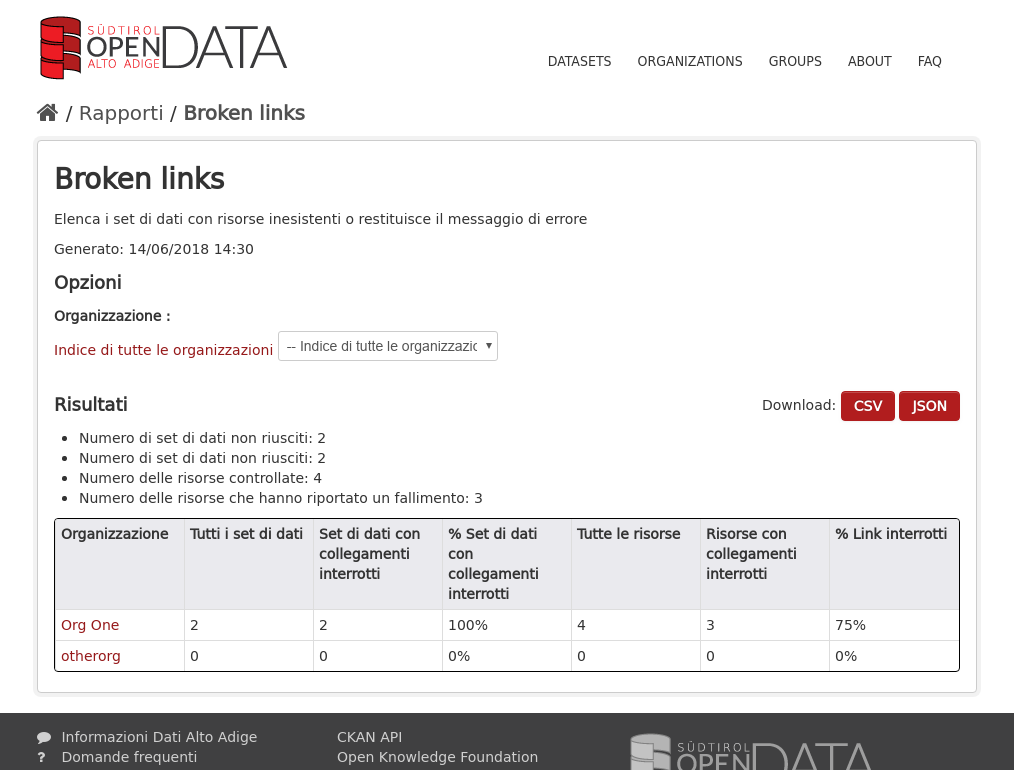
User can filter list by organization, either by selecting one from dropdown, or clicking one in in table. After selecting organization, list of broken links is more detailed, with list of actual resources, grouped by dataset. List contains links to resource, dataset and information of type of error (including response if possible).
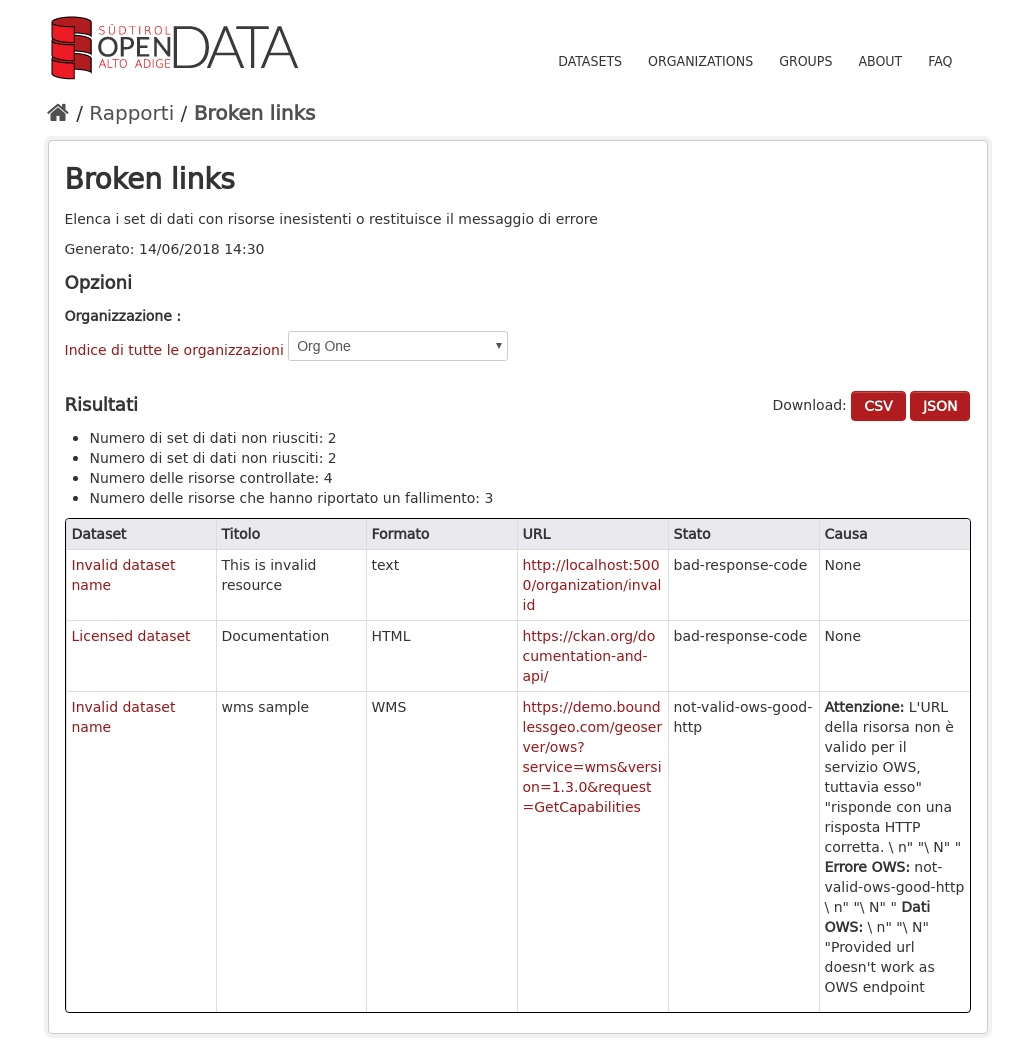
Licenses report view¶
Licenses report view will show types of license and number of datasets using that license. This report will show only public datasets.
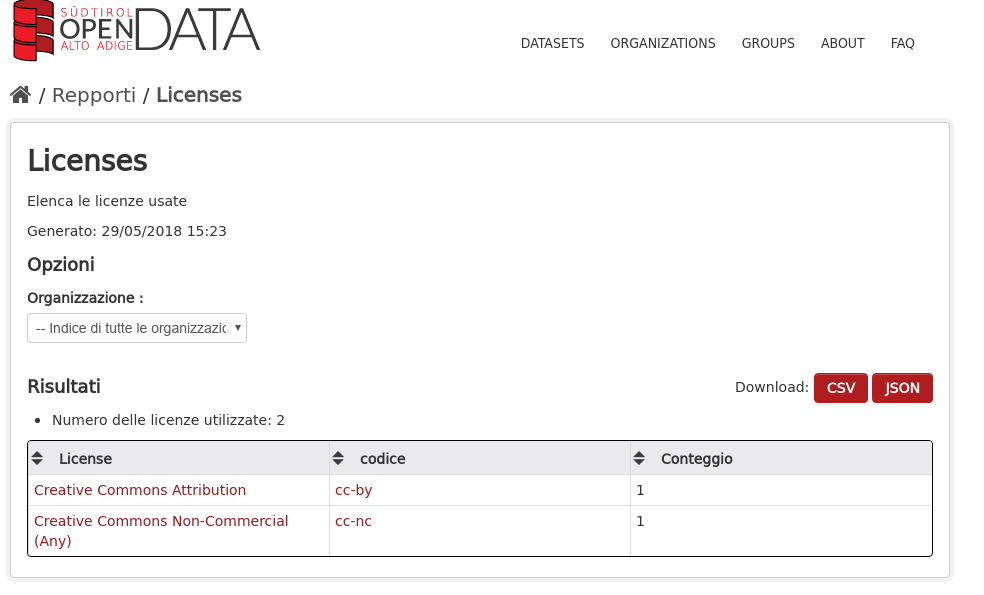
License names will link to search page which will show datasets using specific license.
Resource type report view¶
Resource type report will show types of formats of resources.
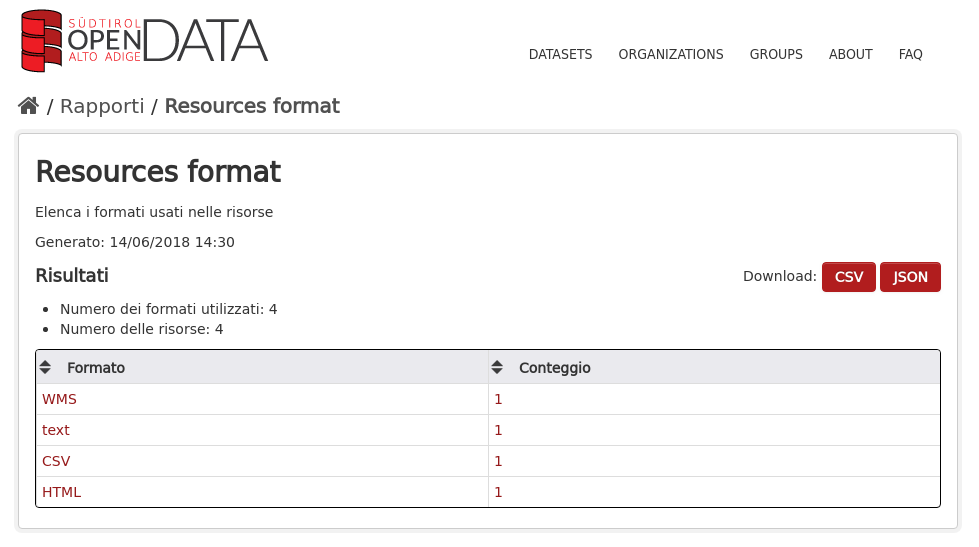
Format name links to detailed report with all resources are using that format. Additionally, detailed report can be filtered by organization.
Note
This view can contain large number of data, and because of that take significant amount of time to render. In order to avoid timeouts and see results quicker, you should set ckanext.gsreport.resource_format.format_limit value in your config.
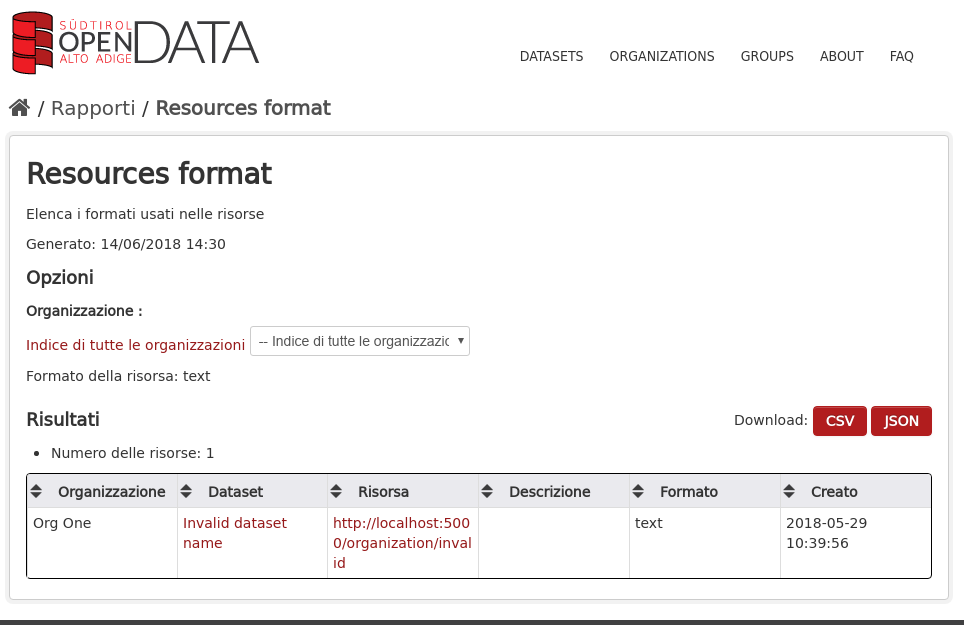
Exporting data¶
Each report can be exported to either CSV or JSON format.
Note
Exported data may contain more data than showed in report view.
Note
Data export will return data only for current view, so, for example if report view shows data filtered by organization, export will also retun data filtered for specific organization only.
Setting the Cron Job to generate report periodically¶
Create a script for running your report generation
Create a script
/usr/lib/ckan/run_gsreports.sh(in the same file system location of the harvester one see also Frequency customizations) with this content:. /usr/lib/ckan/default/bin/activate paster --plugin=ckanext-report report generate $@ --config=/etc/ckan/default/production.ini
and make it executable
chmod +x /usr/lib/ckan/run_gsreports.sh
Tell cron to run your script
Now we have to tell cron to run the script every day at 2 A.M. Open the crontab in editing mode with
crontab -eand add the line0 2 * * * /usr/lib/ckan/run_gsreport.sh &> /usr/lib/ckan/gsreport.log
Extras extension¶
The ckanext-extras CKAN’s extension provides external_resource_list action, which returns list of public resources, which are not local (are served by external service).
Installation¶
Installing all the other extensions required
- Activate your CKAN virtual environment, for example:
. /usr/lib/ckan/default/bin/activate
- Go into your CKAN path for extension (like /usr/lib/ckan/default/src):
git clone https://github.com/geosolutions-it/ckanext-extras.git
cd ckanext-extras
pip install -e .
- Add external_resource_list to the ckan.plugins setting in your CKAN config file (by default the config file is located at /etc/ckan/default/production.ini).
- Restart CKAN.
Configuration¶
This extension uses ckan.site_url value to resolve if url is external. If url starts with local site value, it will be considered as local.
However, it may came to situation, that single site url is insufficient. For that case, you can add ckanext.extras.local_sites to config. This can be a string or list of strings with base urls, which should be considered as local.
Additionally, urls that starts with values from local sites, may be actually external (proxied from external sites). In that case, you can also set ckanext.extras.external_sites
To establish if url is external in such scenario, url will be checked with external sites first (if url starts with external site prefix, it will be considered external at this point), then with local sites (if url starts with local site prefix, it will be considered local). If none of those checks will provide result, url will eventually be considered as external.
Example¶
Sample configuration:
ckan.site_url = http://public.address
ckanext.extras.local_sites =
http://localhost
http://127.0.0.1
ckanext.extras.external_sites =
http://localhost/proxied
http://public.address/remote/
| Url | Is external? |
|---|---|
| http://public.address/index | No |
| http://public.address/remote/index | Yes |
| http://localhost/resource/001 | No |
| http://localhost/proxied/resource/001 | Yes |
Accessing external links list¶
External resources list is available through api, under api/action/external_resource_list endpoint
Sample response:
{"help": "http://localhost:5000/api/3/action/help_show?name=external_resource_list",
"success": true,
"result": {"count": 1,
"data": [{"url": "https://ckan.org/documentation-and-api/",
"id": "5e26f241-d3f9-4f48-b342-03e3364ca16f",
"name": "Documentation",
"dataset":
{"url": "http://localhost:5000/dataset/ed66af9c-d8ee-4dd5-8a05-acbfc760a323",
"id": "ed66af9c-d8ee-4dd5-8a05-acbfc760a323",
"title": "Licensed dataset"}}],
"limit": 50, "offset": 0}}
External resource list accepts two params:
- limit - number of items returned on a page
- offset - offset in list, calculated from item at index 0.
DataPusher¶
Automatically add Data to the CKAN DataStore.
Hint
Doc page at http://docs.ckan.org/projects/datapusher/en/latest/index.html
As root install the WSGI apache module:
yum install mod_wsgi
As ckan, create a brand new virtualenv, and install the datapusher app in it:
virtualenv /usr/lib/ckan/datapusher
mkdir /usr/lib/ckan/datapusher/src
cd /usr/lib/ckan/datapusher/src
git clone -b stable https://github.com/ckan/datapusher.git
cd datapusher/
. ../../bin/activate
pip install -r requirements.txt
python setup.py develop
Create configuration files:
cp /usr/lib/ckan/datapusher/src/datapusher/deployment/datapusher_settings.py /etc/ckan/default/datapusher_settings.py
cp /usr/lib/ckan/datapusher/src/datapusher/deployment/datapusher.wsgi /etc/ckan/default/datapusher.wsgi
Then edit /etc/ckan/default/datapusher.wsgi and adjust the settings path from:
os.environ['JOB_CONFIG'] = '/etc/ckan/datapusher_settings.py'
to
os.environ['JOB_CONFIG'] = '/etc/ckan/default/datapusher_settings.py'
Then create a file name /etc/httpd/conf.d/94-datapusher.conf and add these lines:
Listen 8800
<VirtualHost 0.0.0.0:8800>
ServerName ckan
# this is our app
WSGIScriptAlias / /etc/ckan/default/datapusher.wsgi
# pass authorization info on (needed for rest api)
WSGIPassAuthorization On
# Deploy as a daemon (avoids conflicts between CKAN instances)
WSGIDaemonProcess datapusher display-name=demo processes=1 threads=15
WSGIProcessGroup datapusher
ErrorLog /var/log/httpd/datapusher.error.log
CustomLog /var/log/httpd/datapusher.log combined
<Directory "/" >
Require all granted
</Directory>
</VirtualHost>
Now let’s allow connections to port 8800 in SELinux:
semanage port -a -t http_port_t -p tcp 8800
and restart httpd in order to load the new configuration:
systemctl restart httpd
Test the datapusher entrypoint with a request like
curl http://localhost:8800
on the same machine ckan is running on. You should get a response like this:
{
"help": "\n Get help at:\n http://ckan-service-provider.readthedocs.org/."
}
Now let’s make ckan aware that the datapusher is available.
Edit the file /etc/ckan/default/production.ini and:
add the
datapusherplugin:ckan.plugins = [... other plugins...] datapusher
remove the comments from the lines:
ckan.datapusher.formats = csv xls xlsx tsv application/csv application/vnd.ms-excel application/vnd.openxmlformats-officedocument.spreadsheetml.sheet ckan.datapusher.url = http://127.0.0.1:8800/
Eventually restart supervisord to make ckan reload the configuration:
systemctl restart supervisord
Warning
Make sure that the provbz plugin is placed after these reports plugins in the list. The final order of the plugins list into the CKAN’s configuration (production.ini file) should the following:
ckan.plugins = shibboleth resource_proxy datastore harvest ckan_harvester spatial_metadata spatial_query csw_harvester geonetwork_harvester stats text_view image_view recline_view pdf_view multilang multilang_harvester provbz_harvester pages dcat dcat_rdf_harvester dcat_json_harvester dcat_json_interface status_reports report provbz dcatapit_pkg dcatapit_org dcatapit_config dcatapit_theme_group_mapper dcatapit_ckan_harvester dcatapit_harvest_list dcatapit_harvester dcatapit_csw_harvester external_resource_list
Document changelog¶
| Date | Author | Notes |
|---|---|---|
| Initial revision | ||
| Improve doc for installing shibboleth | ||
| 2018-05-25 | CS | Updated information on additional extensions |
| 2019-01-29 | ETj | Replace shibboleth with provbz-auth |

